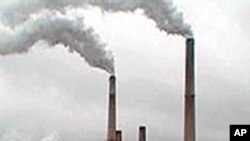Environment ministers from about 40 countries are meeting for two days in Copenhagen to revive climate change talks.
The ministers meeting comes amid deep discord over whether and when a binding climate change treaty can be reached to replace the 1997 Kyoto Protocol. Sunday, Asian and Pacific nation leaders agreed it is unrealistic to agree to a deal at a world summit in Copenhagen next month. They have called instead for a non-binding political agreement as an interim measure.
But several poorer nations, along with some European countries, want Copenhagen to produce a binding treaty.
French Environment Minister Jean Louis Borloo told Reuters news agency the United States is the main problem toward achieving a deal. The U.S. Congress has yet to pass a law capping greenhouse gas emissions, making it difficult for President Barack Obama to act until that happens.
Despite the impasse, climate expert Tom Burke believes there are ways of moving forward. Burke is the founding director of E3G, an environmental nongovernmental organization based in London.
"I think everybody understands that the president [Obama] wants to get back on board. I think we all recognize that the Congress has a way of being spectacularly parochial in its approach to this subject and that in a sense the president has to find a way around that," said Burke. "If that is the problem, I think there is a big willingness to try to accommodate that. If there are bigger problems that the U.S. has, that will be more difficult."
There are other roadblocks. Fast-growing nations like China and India are also reluctant to adopt binding greenhouse-gas reduction measures. Richer nations are also at odds over aid to help poorer ones adapt to climate change. And the 192 nations expected at the December Copenhagen summit have yet to agree on fixed targets for cutting greenhouse gas emissions.
News
Environment Ministers Meet in Effort to Invigorate Climate Talks





